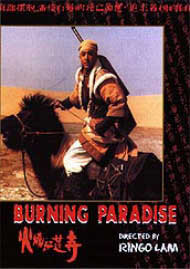Burning Paradise

Reviewed by YTSL
What the...?! From reading descriptions of
the plot and a few (other) reviews of director Ringo Lam's only period piece
(that I know of), I had expected to see action all the way through it.
To be sure, there are numerous -- often very well choreographed (by Chris
Lee) -- fight sequences in this 1993 work. Indeed, there really are
times when it feels like the bulk of the movie consists of Fong Sai Yuk (played
here by Willie Chi rather than, say, Jet Li) running around trying to:
Rescue a woman named Tou Tou (portrayed by Carman Lee) from the evil embrace
of a demented villain (Wong Kam-Kong threatens to steal the show with his
extravagant portrayal of Elder Kung; other formidable figures that the film's
heroes have to contend with are John Ching Tung's Crimson and Lam Chuen's
Brooke); and get her, himself, his comrades and an old teacher out of an
amazing trap-filled Red Lotus Temple (the hellish set is definitely this
production's highlight as well as center-piece).

However, there also are the strangest injections of humor into some surely
inappropriate sections of a generally dark feeling BURNING PARADISE.
Two particularly memorable cases in point: In the midst of a tight
battle, someone with a half agonized, half perplexed expression on his face
demands to know "Who squeezed my Dick?"; and as an injured woman is being
lifted to safety from a dangerous place, she yells at her rescuer -- and
the movie's hero -- to "Don't touch my ass"! Then there are the scenes
of bare backs (one female, one male) being scrubbed by maidens -- as well
as others of attempted seduction plus forced sex (the latter of which is
interrupted by the villain of the piece electing to rip the head off one
of his minions) -- in a movie whose scenes largely take place in a(n admittedly
government seized...but still!) Buddhist temple filled with (enslaved) Shaolin
monks...

Even knowing that Tsui Hark is the producer of BURNING PARADISE did not prepare
me for its being so full of assorted bits and subject to quick mood changes.
While the mixing of diverse and divergent elements works well in some of
his offerings (notably "Peking Opera Blues" and "The Lovers"; two films
which he directed as well as produced), my sense is that it is often too
awkwardly and inappropriately rendered here. Consequently, characters
come across as too inconsistent in nature -- it does not help that a few
of them are not what they first appear to be or turn out to have mixed loyalties
whose reason for being are not well explained -- and proceedings can feel
downright schizophrenic. There's the matter too of my feeling that
greater care ought to have been taken to ensure that such as Fong Sai Yuk's
sword would look less like a large piece of cardboard...

Still, this is not to say that BURNING PARADISE is not capable of entertaining
and enthralling. If the (potential) viewer is willing to forgive the
film's having such faults as those detailed above, and particularly if (s)he
is enough of an action junkie, it does have enough novel and spectacular
elements -- again, as befits a Tsui Hark production -- to offer up a rather
impressive show. This, after all, is a work whose main villain does
not only seem to be a crazed and frustrated artist but is one whose red paint
gets its hue from human blood and who near magically utilizes all colors
of paints -- along with paper and paintbrushes -- as dangerous weapons against
one of the famous Ten Tigers of Kwantung (Hung Hei-Kwun is portrayed by Yang
Sheng) as well as the legendary Fong Sai Yuk. While he is not Asia
the Invincible, Elder Kung is at least colorful enough to bring to mind --
and evoke comparisons with -- the character masterfully essayed by Brigitte
Lin in "Swordsman II" and "The East is Red" (And lest it not be apparent:
Yes, this ought to be taken as quite the compliment indeed!).
My rating for the film: 7.0
Reviewed by Brian
Genocide comes to kung fu film. This incredibly
desolate and disturbing film seems to point an arrow at the darkness and obsession
within man. Red Lotus Temple is the heart of darkness and it is lorded over
by a maniacal madman - part Kurtz, part Lear and part Pol Pot. Driven by
his own demons he has created a world around him from which there is no escape
- not even for him. Into this shadowy and claustrophobic world are brought
the remnants of the Shaolin Temple - the rest already exterminated - hanging
from tree branches, dry bones left in the desert sun - proud men now degraded
to slave labor. Led by Fong Sai Yuk, rebellion, heroism and sacrifice is
inevitable.

Tsui Hark and Ringo Lam create a mesmerizing, tense and incredibly imaginative
rendering of this world. It combines Tsui's spectacular imagery with Ringo's
bleak and violent outlook and it sucks you in like a recurring nightmare
- all closed in - constricted - death literally ready to snuff you out at
any moment. It is simply brilliant movie making.

The sets and construction of The Red Lotus Temple is a delight - intricate
- with twists, turns, traps and pitfalls everywhere. It is as much a character
in the film as anyone. Though Elder Kung (Wong Kam-kong) clearly overshadows
the rest of the cast with a demonic charismatic performance, the martial
arts scenes with Willie Chi, Yang Sheng and Lam Chuen are fabulously choreographed
full of astonishing acrobatics and the clanging of weapons. There are moments
in this film that had me holding my breath or gasping in surprise and amazement.
 My rating for this film: 8.0
My rating for this film: 8.0







